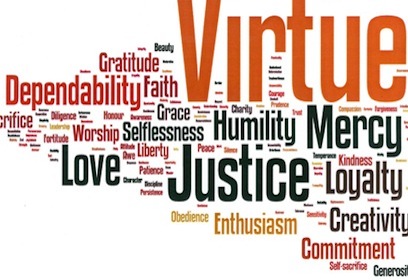As a former philosophy professor, I’ve especially admired Larissa MacFarquhar’s profiles in The New Yorker. She takes her subjects’ ideas seriously and has an enviable gift for representing them in flesh-and-blood lives. Whether she’s writing about the crazy love of dogmatic materialists Paul and Patricia Churchland or the Aquinian rigor and Victorian piety of Derek Parfit, she reveals their character and motivations by clarifying for the reader why their work matters.
I recently had the pleasure of chatting with her at Stanford University’s Coffee House about her current book project, which examines cases of extreme moral virtue. She launched her research with a celebrated piece on people who have donated their kidneys to complete strangers. MacFarquhar was visiting campus to discuss her work later that evening at a Center for Ethics in Society event. Her talk focused on another of the book’s case studies: a Boston couple who live according to philosopher Peter Singer’s strict utilitarian constraints about relieving human suffering. Why do we feel ambivalent about those who would devote all their income and leisure time to ameliorating poverty—or, for that matter, those who would donate kidneys to strangers? Whatever the reason, MacFarquhar’s reporting promises to challenge our basic assumptions about moral outliers.
— David V. Johnson
David Johnson: How did you become interested in extreme cases of moral virtue?
Larissa MacFarquhar: I’ve been interested in them for a long time, but one of the things I read that got me thinking in a more systematic way was the philosopher Susan Wolf’s essay “Moral Saints.” [PDF] She argues that our conceptions of perfect moral virtue (what she calls saintliness) and of a well-lived life are irreconcileable, so one of them has to go. She is basically anti-saint—she concludes that it’s our view of morality that has to go. I tend towards the other conclusion, but her essay was very useful in framing the question. It seemed to me, though, that you couldn’t think about the problem only in the abstract. If you want to consider the cost of making certain ethical decisions, you have to see how they play out in actual lives. So that’s why I decided to write about people who have a very demanding sense of moral duty and live their lives accordingly.
DJ: Some people think duty is overrated.
LM: Many do, many do. But I don’t think a life is necessarily constricted in the way Susan Wolf seems to think it is if it lacks things such as artistic hobbies, or the sort of spontaneity that spending money can bring you. Wolf places a great deal of value on well-roundedness, which is a nice thing, but it doesn’t seem to me to be one of the most valuable things about human existence.
DJ: So are you writing a defense of moral saints?
LM: More or less, yes. And part of the book will be a history of a kind of counter-morality that opposes what I’m calling saintliness. (Obviously that term has religious connotations, but I don’t intend those; I mean extreme morality.) I find the people I’m writing about extremely admirable, and I’m puzzled by the suspicion they attract. When I started working on this project I was simply interested in what a life lived according to certain kinds of moral strictures looked like. But when I wrote about people who had donated one of their kidneys to a stranger, I was astonished and fascinated to hear about how much hostility they had encountered, and I wanted to think about what was behind that.
DJ: Outsiders were suspicious.
LM: They were. But in all sorts of different ways. Some thought people who appeared to be extremely ethical must be somehow cheating—that they couldn’t actually be doing all those good things. Others believed they were doing those things, but they found that so weird that they thought they must have some kind of mental illness—that they must lack the ordinary component of desires or feelings, or that there was something robotic about them.
DJ: You’ve written a lot about extreme personality types or people who are very unusual, and not just in terms of their achievements but also in terms of their psychologies. For example, philosopher Derek Parfit or poet John Ashbery. Why have you chosen to focus on moral outliers, rather than other types of extreme personalities?
It’s entirely possible to live an extremely ethical life without being hypocritical.
LM: Because moral behavior is what interests me. I’m not interested in extremism per se. Parfit and Ashbery are interesting because of their work, not because of personality quirks. To me, the compelling question here was not extremity as such, but whether there is any limit to what can be morally required of us, and whether there’s anything wrong with a life that’s lived according to extreme moral principles.
DJ: Susan Wolf is certainly right that we find moral saints problematic. But what are we getting wrong when we view them skeptically?
LM: If the suspicion is hypocrisy, I think we underestimate the sort of people I’m writing about—it’s entirely possible to live an extremely ethical life without being hypocritical. But besides that, I think people overvalue certain kinds of sins. For instance, many people have said to me, when they hear who I’m writing about, ‘Well, don’t they just act morally to make themselves feel better? Don’t they get all self-righteous and overly proud of themselves?’ I think that pride and self-righteousness are far less important than most people seem to think they are. I think that if you’re doing something that’s hard to do and good to do, and that makes you feel proud, I just don’t see why that’s so terrible. One kidney donor told me that his donation made him feel better about himself—that it was one really good thing he’d done in his life, which he had otherwise made a pretty complete mess of. Some psychologists think you shouldn't donate in order to feel better about yourself, but it strikes me as an excellent reason!
What’s more, I think what is criticized as self-righteousness or preachiness is often the result of a desire to further whatever cause the person is engaged in. If a person held back from talking about his cause out of a desire to appear less self righteous, that would be its own problem—and a much more serious one. The people I’m going to talk about tonight encounter this problem all the time and they wrestle with it.
DJ: Whom are you talking about tonight?
LM: I’m talking about a young Boston-area couple who are utilitarians. They actually had not read Peter Singer until recently, but they came independently to more or less the same conclusions as he does about our duty to help others. They give away nearly all their money, to the charity that, according to their research, seems to improve the most lives for the least money. They struggle with the question of when and how to talk about what they do because, on the one hand, they know that people hate talking about money, hate to be made to feel guilty, and hate people who seem to boast about doing the right thing. On the other hand, they wonder, well, am I entitled to worry about these social niceties? Because saving lives is more important than embarrassment.
DJ: And so do they think they’re being especially morally praiseworthy, or do they think we’re all getting it wrong and that we should be following their lead?
LM: The latter. They don’t think they’re saintly people; they think they’re just doing their duty. They think about it in the same way most people think about not stealing: we don’t get proud of ourselves for not stealing, because it just goes without saying. They feel like that.
DJ: But consider artists or athletes who lead very unusual sorts of lives in what they dedicate themselves to. The difference with morality is that people such as rigorous utilitarians believe everyone else ought to follow what they’re doing. It obviously generates a certain tension with ordinary folk like us. It’s not simply that they’re living this unusual praiseworthy life but that they think we ought to be living that way too—that we somehow got things wrong.
LM: That’s true, they do think that—though that’s hardly a thought unique to utilitarians. Many people believe that the way they live their lives is the right way to live, and what’s wrong with that? The opposite is obviously worse. But it’s important to remember that utilitarians aren’t focused on righteousness as such—utilitarians don’t care about personal qualities like perfection or purity. They’re focused on the fact that millions of people live awful lives because of poverty, and they believe that if we hoard resources for ourselves we’re refusing to alleviate their misery.
DJ: So have you changed your thinking or behavior at all after meeting the Boston couple?
LM: Not much, I admit. But I attribute that to my weakness, not to a belief that they’re wrong. I admire them wholeheartedly, and I also think their lives are as happy as any other lives. Part of that is that they’ve worked out a clever financial system within their marriage that enables them to give an extremely large percentage of their money away without giving up on basic necessities or making themselves miserable. They save a little bit, they have health insurance, they don’t eat out of the garbage cans, they buy ice cream. That’s why I think they’re challenging. I wanted to write about people who took moral principles very seriously, but not people who were so eccentric and kooky as not to pose a challenge to the rest of us.
DJ: Have there been any people you’ve profiled who’ve made an impact on your thinking or the way you view yourself?
LM: Well, certainly all of the people I wrote about in the book made me feel guiltier.
DJ: Why more guilty? Did they make you feel like a slacker?
LM: Of course. How could you not reach that conclusion?
DJ: Are there any moral saints in your own life, among family and friends?
LM: Not of type that I’m writing about. There are very few of these people. For instance, I’m writing about a couple in Philadelphia who’ve adopted 20 special needs kids. There aren’t many people like that floating around. When I mention this couple to people, often the response I’ll get is either, “Who do they think they are, that they think they can bring up 20 kids?” (in fact it’s 22 children because they had 2 biological children), or, “Surely that must be damaging to those children to have so many siblings. How can they possibly make it work as a family?” I’ve come to realize that this is one of the dividing lines between the people I’m writing about and regular people. For a regular person, caring more for your own child than for other children is not only morally permissible, it is required, and not doing so is kind of monstrous; but the people I’m writing about don’t feel that way. An ordinary couple considering whether or not to adopt a new kid would ask themselves how this would affect the children they already have. The couple I’m talking about do ask themselves that question, but they also ask themselves how the potential adoptees will be affected. The answer might be, well, it might reduce the quality of life of the children I already have somewhat. But will it increase the quality of life of the children I adopt? Enormously. And that thought is going to win. Most people don’t think that way.
If someone has interesting thoughts, they lead an interesting life.
DJ: It’s almost as if the people you’re following are conducting experiments in living. Here’s an experiment of leading life in an entirely different way: we’re going to adopt 20 special needs children and see how it goes.
LM: And I think they’ve done an amazing job.
DJ: Is this sort of research for finding out possibilities for ordinary people, or is it this really about extremely rare, interesting cases to examine?
LM: It’s both. As I said, I want each of the people I’m writing about to be challenging; I don’t want them to be seen as kooks. I certainly didn’t want to write about anyone who was obviously irritating. Of course, inevitably some people are going to think of them as kooks, but I don’t think they are, and I think they pose a challenge precisely because they’re not. I think people often react to Peter Singer’s strictures by feeling that a life lived according to such principles is unimaginable. What this Boston couple does, in my view, is make such a life imaginable, and enable people to see that it’s in fact not as austere and forbidding as it sounds. These are all extremely unusual people, but doing what they do is no more impossible for the rest of us than the work of the other unusual people I’ve written about. None of them is doing anything that’s as impossible for the average person as what Derek Parfit does, for example.
DJ: Speaking of Parfit, how did you get interested in writing about philosophers? As a journalist, I’m thinking these people might have really interesting things to say but lead boring lives.
LM: Really? To me, if someone has interesting thoughts, they lead an interesting life.
DJ: How do you select your profile subjects?
LM: Well of course it’s helpful if someone seems to be an interesting personality as well as an interesting thinker, but in general what I’m trying to get at is, first, what quality is it that makes them so good at what they do, and, second, what caused them to fall in love with a certain set of ideas. The first thing is always their work. I don’t write about people whose work I don’t admire. When you’re writing a profile you spend a long time with that person, and it’s very difficult to go into that in bad faith, knowing you think their work is not good. I will do anything to avoid that situation. I’d make an exception for politicians, though—I would feel just fine profiling a politician I thought was appalling.
DJ: When you write narratives of these figures, do you ever get caught up in the question whether they’re right? For example, is Parfit right about morality? Is Singer?
LM: Of course. How could you not?
DJ: How wrapped up do you get?
LM: Well, with Singer completely, of course, because that’s the whole point. The whole point of reading him is to decide whether or not he is right, because if he is, there are some pretty extreme implications.
DJ: If I’m a philosopher—someone who cares whether Parfit is right or not—what will I get out of reading your profile on Parfit that I won’t get from his books?
LM: If you’re a philosopher you’re going to be able to get much more out of his books than I can, but what I can add, I hope, is a layer of depth that is gained by looking at the books in the context of his life. To me, for instance, it seems significant that he comes from missionary parents, because he believes there are objectively correct moral principles that exist independently of human thought, in the way that a religious person believes that God exists. (When I was in college, moral realism was quite an uncommon position in philosophy, so I was surprised to find Parfit arguing this; I have been told that these days moral realism is much more common.) Now, Parfit is an atheist, but I thought it was interesting that he came from not just an ordinarily religious family but a deeply religious family that belonged to the Oxford Group, a Christian society that imposed extremely high moral and devotional standards on its members. Parfit himself was quite religious as a child. All of these facts seemed to me to add something to a reading of his books.
As for his various eccentricities, I don’t think they add anything to an understanding of his philosophy, but I find him very moving as a person. When I was interviewing him for the first time, for instance, we were in the middle of a conversation and suddenly he burst into tears. It was completely unexpected, because we were not talking about anything emotional or personal, as I would define those things. I was quite startled, and as he cried I sat there rewinding our conversation in my head, trying to figure out what had upset him. Later, I asked him about it. It turned out that what had made him cry was the idea of suffering. We had been talking about suffering in the abstract. I found that very striking. Now, I don’t think any professional philosopher is going to make this mistake, but nonprofessionals might think that utilitarianism, for instance (Parfit is a utilitarian), or certain other philosophical ways of think about morality, are quite unemotional, quite calculating, quite cold; and so because as I am writing mostly for nonphilosophers, it seemed like a good corrective to know that for someone like Parfit these issues are extremely emotional, even in the abstract.
The weird thing was that the same thing happened again with a philosophy graduate student whom I was interviewing some months later. Now you’re going to start thinking it’s me, but I was interviewing a philosophy graduate student who, like Parfit, had a very unemotional demeanor; we started talking about suffering in the abstract, and he burst into tears. I don’t quite know what to make of all this but I do think that insofar as one is interested in the relationship of ideas to people who think about them, and not just in the ideas themselves, those small events are moving and important.
DJ: Are you religious?
LM: No.
DJ: Were you brought up religious?
LM: No.
DJ: One thing I find is that for people not brought up in religious households, religion seems bizarre. They can’t understand how anybody could even care about the problems that religious people focus on. How have you approached religious figures that you’ve written about? How have you grappled with the fact that you haven’t had the same internal tensions or experiences that they’ve had?
LM: The people I’m writing about are very unlike me in a whole range of ways, so that’s just one of them. I deal with it the same way I would deal with anything else, which is to listen to what they say and try to ask the right questions. I do ask what difference God makes to their ethical beliefs, but it’s as hard for them to imagine a world without faith as it is for me to imagine a world with it.
Kimberley Brown-Whale, a Methodist minister whom I wrote about in my kidney donor piece, described a difference between religious people such as herself and secular people that was very enlightening. She said that if you believe in God, you believe in grace, and so you don’t think it’s up to you to fix the world—that’s God’s business. Your job is to do your duty as best you can, but there’s never this sense that if I don’t do it, there will be disaster. God is in control, and God’s love will see the world through. Whereas for secular people, it’s all up to us. We’re alone here. That’s why I think that, for secular people, there can be an additional layer of urgency and despair.
I also think that, within many religious traditions, there is a much more of an acceptance of suffering as a part of life and not necessarily always a terrible thing, because it can help you become a fuller person. Whereas, at least in my limited experience, secular utilitarians hate suffering. They see nothing good in it, they want to eliminate it, and they see themselves as responsible for doing so.
Editor’s Note: This interview was published in collaboration with the Center for Ethics in Society at Stanford University.






